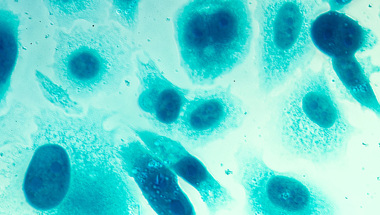
Using genetic data to predict progression and reduce recurrence

Grant information
Reference: MA-TIA23-002
Researchers and institutions:
Professor Rosalind Eeles, The Institute of Cancer Research
Professor Daniel Brewer, University of East Anglia
Professor Colin Cooper, University of East Anglia
Professor David Wedge, The University of Manchester
Dr Harveer Dev, University of Cambridge
Dr Dan Woodcock, University of Oxford
Award: £1,499,998
What you need to know
-
Researchers from 9 countries have collected and analysed prostate cancer and blood samples from 2,000 men with the disease.
-
This project will use advanced genetic data and analysis, including artificial intelligence (AI) to develop models that can predict which men are most at risk of their disease progressing or recurring, enabling doctors to provide targeted treatments for men at higher risk.
-
The findings could lead to better early detection, personalised treatments, and potentially even ways to prevent the spread of prostate cancer.
What will the researchers do?
One of the biggest challenges in diagnosing and treating prostate cancer is that it isn’t always clear which cancers are most likely to spread (aggressive prostate cancer), and which are most likely to come back after treatment (recurrent prostate cancer).
This project aims to tackle these challenges so that more men can get the treatment they need to live a long, healthy life.
The researchers will do this using data from the Pan Prostate Cancer Group (PPCG), a team of researchers in nine countries who are experts in the genetics of prostate cancer.
Working with the PPCG team, they have collected and analysed blood and tumour samples from 2,000 men to see what DNA changes are present in each sample, and whether the cancer was aggressive or not.
Now, they will use advanced analysis and AI to look at the data as a whole and see what patterns emerge. For example, are certain genetic changes linked with more- or less-aggressive kinds of prostate cancer?
This will enable them to come up with a model that can predict from blood and tumour samples whether the man is likely to have aggressive cancer. They’ll test this model on samples from the STAMPEDE clinical trial, and from men who are on active surveillance to see if it is accurate, and whether it can spot men at high risk.
The researchers will also study samples from men who have gone through radiotherapy, to see if they can predict which men’s cancers are likely to come back after treatment. This is based on previous research where they discovered a set of genetic changes that can predict whose cancer is most likely to come back after surgery, so now they want to test if the same applies to radiotherapy.
Finally, they will delve deeper into their recent finding of previously unknown bacteria in men with prostate cancer, to see whether these bacteria play a role in the disease’s progression. If this is the case, they will look at whether men on active surveillance should be tested for these bacteria.
This funding will enable us to analyse the genetic data from thousands of men from diverse backgrounds and ethnicities around the world, helping us to answer important clinical questions.
How will this benefit men?
This project could significantly improve how prostate cancer is diagnosed, treated and managed.
A model that can predict which prostate cancer is aggressive, or which one is likely to return after treatment, would help doctors pick the best treatment to minimise this risk. This would give men a better chance of a long, healthy life; while minimising the need for treatment (and therefore potential side effects) for men whose cancer is lower risk.
It would also enable doctors to more closely monitor men whose cancer is at high risk of returning after treatment, so that any recurrence could be caught and dealt with sooner.
Finally, if the researchers discover that bacteria can influence the disease, it may be possible to come up with new ways to slow or stop the disease from worsening by targeting these bacteria.
Help us fund more research like this
Your donation helps us fund lifesaving research into better treatments for prostate cancer.




